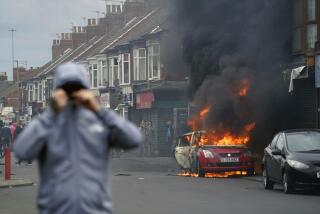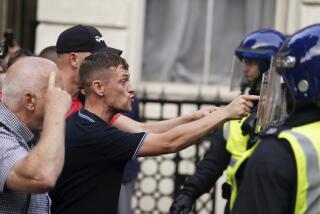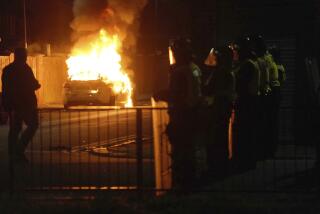Cameron vows ‘uncompromising measures’ in dealing with riots
- Share via
Reporting from London — Haggard lawyers rushed around searching for clients or killed time waiting for paperwork Thursday at Westminster Magistrates Court in central London while bewildered defendants facing riot-related charges wondered about their fate.
Inevitable delays interrupted proceedings as an overloaded court system attempted to cope with crowded basement cells and a constant stream of security vans carrying defendants mainly accused of offenses such as looting and violent behavior.
“Chaos reigns downstairs,” one defense lawyer told presiding Judge Daphne Wickham.
Another lawyer working around the clock, Julian Young, said law enforcement’s decision to mete out swift justice was “inefficient,” and “a knee-jerk reaction.” Youths and first-time offenders held in custody and taken to a court at 5 in the morning could make inaccurate statements and overworked lawyers may well make mistakes, Young said in television interviews.
Westminster was among several courts in cities including London, Birmingham and Manchester dealing with similarly overwhelming workloads coming from the hundreds of arrests in connection with four nights of rioting in Britain that began Saturday. After a violence-free night Wednesday, communities and authorities were left surveying the damage as stricken cities attempted to get back to business and the judiciary and Parliament struggled to mete out law and order.
Facing a full house at an emergency meeting of Parliament on Thursday, British Prime Minister David Cameron promised “robust and uncompromising measures” in response to the riots.
“To the lawless minority, the criminals who have taken what they could, we will hunt you.... We will punish you,” he said.
He vowed greater police powers, including the ability to unmask rioters, greater coordination between police and the community, and compensation funds for victims of violence and arson.
Speaking to a packed house of lawmakers called back from vacation, Cameron said police acknowledged that they were initially unprepared for and outnumbered during the flash riots, but he praised officers, firefighters and community workers who struggled to protect neighborhoods. He paid special tribute to Tariq Jahan, who called for justice to take its course even after his 21-year-old son Haroon and two friends died after being hit by a car as they guarded their neighborhood in Birmingham.
To victims of the violence, Cameron pledged compensation, even for the uninsured. “We will help you repair the damage, get your businesses back up and running, and support your communities,” he said. Claims are expected to exceed $300 million.
Budget cuts in police services, part of the government’s overall plan to reduce a huge deficit, would not be revoked, Cameron said.
Police would receive any “funds they need to meet the cost of any legitimate aims,” but plans to reduce their overall budget by 6% over the next four years would proceed, he said.
Among their new powers, the prime minister said, would be the ability “under any circumstances” to demand that crime suspects remove face coverings. Many looters who ransacked shops during the riots wore masks to avoid being identified.
Crowd-dispersal and curfew regulations also would be reviewed, Cameron said.
He described what he sees as the underlying causes of the recent violence: a culture of disrespect for authority, gang culture, and children growing up in dysfunctional families.
Gang injunctions would be used across the country for children and adults, he said. Other sanctions are already in place — local authorities, for example, can evict perpetrators of violence and disorder from subsidized housing — but they could be strengthened, he said.
Cameron noted the efforts of people such as William J. Bratton, who headed police forces in New York, Boston and Los Angeles and is said to have been suggested as a possible outside candidate for the now-vacant post of chief commissioner for Scotland Yard.
As Cameron spoke, courts around the country were struggling to handle riot-related cases, some conducting around-the-clock sessions. By Thursday night, the number of arrests was at least 1,000, police said.
The mix of suspects included schoolchildren, professionals, homeless teenagers and youths with police records.
A group charged with violent disorder for allegedly trying to set fire to a cafe in the wealthy north London neighborhood of St. John’s Wood included 18-year-old Samir Shah, who Thursday protested at the court in central London: “You’ve got the wrong guy.... I’ve got a university place in September.”
Stobart is a news assistant in The Times’ London bureau.
More to Read
Sign up for Essential California
The most important California stories and recommendations in your inbox every morning.
You may occasionally receive promotional content from the Los Angeles Times.













